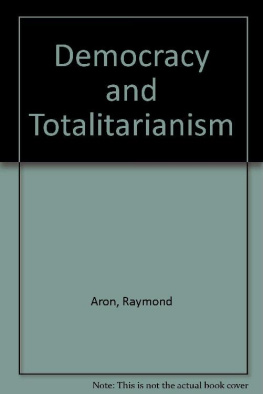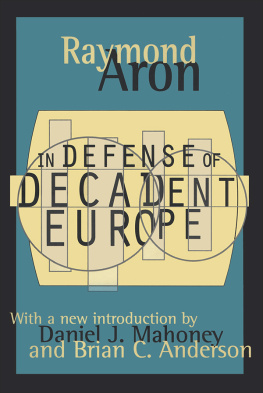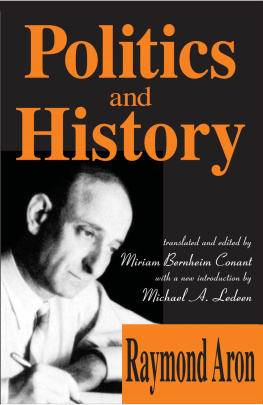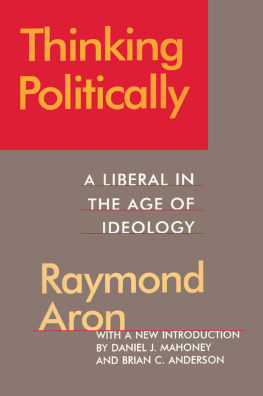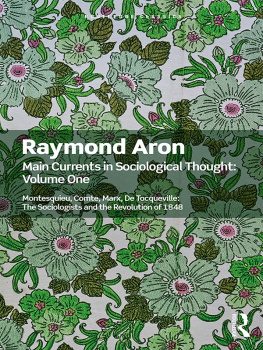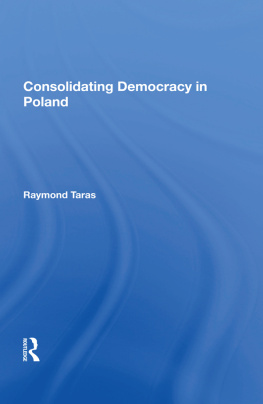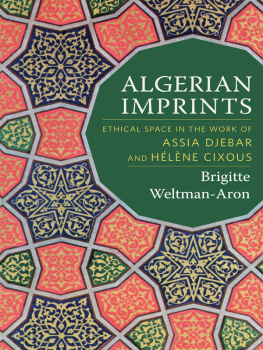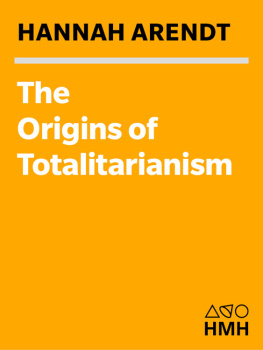Raymond Aron - Democracy and Totalitarianism
Here you can read online Raymond Aron - Democracy and Totalitarianism full text of the book (entire story) in english for free. Download pdf and epub, get meaning, cover and reviews about this ebook. year: 1968, publisher: Weidenfeld and Nicolson Ltd, genre: Politics. Description of the work, (preface) as well as reviews are available. Best literature library LitArk.com created for fans of good reading and offers a wide selection of genres:
Romance novel
Science fiction
Adventure
Detective
Science
History
Home and family
Prose
Art
Politics
Computer
Non-fiction
Religion
Business
Children
Humor
Choose a favorite category and find really read worthwhile books. Enjoy immersion in the world of imagination, feel the emotions of the characters or learn something new for yourself, make an fascinating discovery.
- Book:Democracy and Totalitarianism
- Author:
- Publisher:Weidenfeld and Nicolson Ltd
- Genre:
- Year:1968
- Rating:5 / 5
- Favourites:Add to favourites
- Your mark:
- 100
- 1
- 2
- 3
- 4
- 5
Democracy and Totalitarianism: summary, description and annotation
We offer to read an annotation, description, summary or preface (depends on what the author of the book "Democracy and Totalitarianism" wrote himself). If you haven't found the necessary information about the book — write in the comments, we will try to find it.
Democracy and Totalitarianism — read online for free the complete book (whole text) full work
Below is the text of the book, divided by pages. System saving the place of the last page read, allows you to conveniently read the book "Democracy and Totalitarianism" online for free, without having to search again every time where you left off. Put a bookmark, and you can go to the page where you finished reading at any time.
Font size:
Interval:
Bookmark:
THE NATURE OF HUMAN SOCIETY
DEMOCRACY AND TOTALITARIANISM
THE NATURE OF HUMAN SOCIETY SERIES
Editors : JULIAN PITT-RIVERS and ERNEST GELLNER
DEMOCRACY AND
TOTALITARIANISM
Raymond Aron
Translated by Valence Ionescu
WEIDENFELD AND NICOLSON
5 WINSLEY STREET LONDON WI
ID 1965 by Editions Gallimard
English translation 1968 by
George Weidenfeld and Nicolson Ltd
First published in France 1965 under
the title Democratic et Totalitarisme
by Editions Gallimard
SBN 297 76311 3
Printed in Great Britain by
The Camelot Press Ltd., London and Southampton
CONTENTS
INTRODUCTION
This book, which was first published by the Centre de Documentation Universitaire under the longer but more accurate title Sociologie des societs industrielles, esquisse d'une thorie des rgimes politiques , is the third in a series, of which the first two are Dix-huit leons sur la societ industrielle and La lutte des classes (published by the CDU as Le developpement de la societ industrielle and La stratification sociale . Although each of the three books is complete in itself and can be read separately, it is only through reading the series that the real meaning of the investigation can be grasped.
The nineteen lectures which go to make this book were given at the Sorbonne during the academic year 1957-8. I must therefore repeat the warning which I gave in the preface to Dix-huit leons sur la societ industrielle .
This course of lectures, which represents a period in my research and which was meant to be useful to students, although it suggests a method, outlines conceptual notions, puts forward facts and ideas, bears the inevitable traces of the lecture room and of improvisation. The lectures have not been edited; the style is therefore that of the spoken word, with the unavoidable flaws that later correction can smooth over, but cannot eliminate.
The reader should not forget the date on which these lectures were given 1957-8 if he would find the right interpretation for them, especially for the eleventh, "The corruption of the French system", and even more particularly for the last, the nineteenth, which was delivered during the second half of May, after the events of 13 May and before General de Gaulle came to power. The result is, naturally enough, that the reflections on the French regime, that is to say on the Fourth Republic, are no longer of contemporary interest. They are retrospective in character just as are those on the Weimar republic. Yet they have not lost all their significance. They may possibly even have gained in historical scope what they have lost on the political or journalistic plane. The transition from the Fourth to the Fifth Republic is already in its way as classic an example of the end of a degenerated democracy as was the transition from the Weimar Republic to the Third Reich. In some ways it is as reassuring an example as that of the Weimar Republic was terrifying.
In both cases, a legal or semi-legal coup d'tat took place Hitler was appointed chancellor by President Hindenburg just as General de Gaulle, appointed by Rene Coty, was legally invested by the French National Assembly. But the vote only seemed to be free. Sedition had preceded seduction. Historians are still arguing about the part played by General de Gaulle himself in events in Algeria. He was not alone in desiring or encouraging the revolt of the French and of the army in Algeria but, after the declaration to the press of 15 May, at the moment when those who were on the brink of revolt in Algeria seemed to hesitate to cross the Rubicon, it was he who directly or through intermediaries took the lead, keeping a great enough distance between himself and the men of Algiers to enable him to appear as an arbitrator, if not a saviour, to political circles in the Fourth Republic. The politicians were aware that they would lose power when the lone wolf from Colom bey assumed it once more, but if the operation which was known as Resurrection had been carried out, they would have lost more than power. The French again showed themselves to be expert in the art of legal coups d'tat, to use once more a phrase from the nineteenth chapter. The vote of June 1958 in the National Assembly was taken under pressure and can be compared in this respect to the vote in the National Assembly in Vichy in June 1940. The shadow of the pretorian guards loomed over the 'windowless house' of the Palais Bourbon, just as eighteen years earlier it had fallen on the Casino in Vichy. The republic of the deputies in the twentieth century had no martyrs whose names can be remembered by historians in the way that Baudin, the victim of the overt coup d'tat of Louis Napoleon has been remembered.
Whatever judgment one makes of the transition from one republic to the other in MayJune 1958, it cannot be denied and these lectures bear witness to it that both actors and onlookers in the Fourth Republic in 1957-8 had a sense of the crisis of the regime. The crisis arose from the superimposition of the difficult problem of the destiny of Algeria French as one said at the time on weak and discredited institutions. To historians of today, with the objectivity of hindsight, the balance sheet of the Fourth Republic does not seem to be as disastrous as it appeared to be at the time, eight years ago. Adaptation to the world situation, the reconciliation with the German Federal Republic, the Coal and Steel Community were realities; the treaty of Rome had been signed. Before the Fourth Republic could match its century, only two obstacles remained to be surmounted: to put an end to the merry-go-round of governments which even if its consequences were not as tragic as the eternal anti-parliamentarianism of the French claimed, made le pays legal (the establishment) ridiculous abroad: to bring the Algerian conflict to an end and to accept the decolonization demanded by the spirit of the times, the anti- colonialism of the two Great Powers and France's own weakness after the Second World War.
These two obstacles were probably insurmountable. General de Gaulle would never have given his sanction to decolonization unless he himself were given both the responsibility and the credit for it. He was not an elder statesman, anxious to enlighten the nation, but a politician, impatient to reach the only office which he thought worthy of him, the highest, 'the embodiment of the law'. In any case, it would have been difficult for the Republic of the deputies to reform itself. The historical and social circum stances which lay behind the experience of the Fourth Republic are many and varied. Since 1789, France has never had a govern ment which was accepted by the whole nation; it has never had a few organized political parties, unwritten and respected parlia mentary ethics or cabinet stability within a parliamentary system. Nor for two centuries has there been any example of a French regime which knew how to reform itself.
The few opportunities which the Fourth Republic might have had to overcome these obstacles vanished, largely because of the composition of the Fourth Republic's last National Assembly and of the action within it of the Gaullists. General de Gaulle shut himself away in a mysterious silence; every visitor returned with the feeling that de Gaulle agreed with him. The liberals were even more convinced of this than were the 'ultras', but what the ultras counted on was that power should bring the former leader of the Free French back to the principle which had been his during the war: to preserve every inch of French territory over which the French flag flew. While waiting, the Gaullist ultras were full of hope and denounced their compatriots who advocated a policy which they themselves were to carry out some years later.
Thus, the man whom eight years ago I called the lawful saviour became the heir of the 'degenerated Republic' (a degeneration which he had done his utmost to bring about). He assumed in turn, as I outlined in the nineteenth chapter, the offices of dictator (in the classic meaning of the word) and of legislator. The end which he brought to the Algerian war seems to confirm the theory which I suggested in that chapter: The French are wrong when they blame their regime for the loss of empire, or 'the decoloniza tion' which were the result of irresistible world forces. In fact, it can truly be said that the Fourth Republic was unable not to keep, but to give up Algeria. France had need of a strong government if it was to rise to the heroic heights of renunciation. The shadow of General de Gaulle and of his henchmen prevented every government in the Fourth Republic from doing what most of them thought was inevitable and desirable. Only a few tragic personali ties, such as Georges Bidault, for example, remained true to themselves right to the very end, in exile or in prison, or perhaps true to their idea of General de Gaulle who never gives up anything. I cannot help feeling some sympathy with those who, in contrast to the wholly dedicated Gaullists, put loyalty to their ideas above loyalty to a person.
Next pageFont size:
Interval:
Bookmark:
Similar books «Democracy and Totalitarianism»
Look at similar books to Democracy and Totalitarianism. We have selected literature similar in name and meaning in the hope of providing readers with more options to find new, interesting, not yet read works.
Discussion, reviews of the book Democracy and Totalitarianism and just readers' own opinions. Leave your comments, write what you think about the work, its meaning or the main characters. Specify what exactly you liked and what you didn't like, and why you think so.

